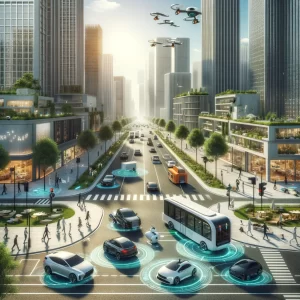The year is 2022. A group of students gathered for their weekly computer science club meeting to discuss technology-related topics. This week they focused on the different approaches AI can be utilized in the field of education. Among them was Zaza, a young curious mind but with a lot of skepticism towards the ethics of AI and the way it could impact the educational system. This time the meeting felt different from all previous ones. ChatGPT had been released to the public and everyone was amazed by the responses they were getting. Zaza was completely astonished by the fact that the computer could provide such well-structured sentences that had meaning and context and her mind was changed forever.
The digital revolution is already occurring, and education is one of the sectors standing at a crucial intersection. Because of the rapid growth of Artificial Intelligence (AI), some newly introduced tools like ChatGPT, a large language model that can generate text, in the same way as humans, have caused chaos in educational discourse across the world. AI has upended all established paradigms for learning. This has cast serious doubt on the integrity and efficacy of the system. As we try to navigate this new era of co-living with AI, it is more critical than ever to examine the impact that the latter has on our education and turn our focus into exploring new transformative strategies that foster authentic learning and intellectual growth.
(Tuesday Hadden | Head of Illustration, retrieved from https://www.studlife.com/news/2023/02/01/chat-gpt-sparks-concern-and-hope-for-professors )
The Problem at Our Educational Doorstep
The introduction of AI into educational environments has encouraged a lot of students to adopt a philosophy of dependence and cheating. This in turn opens a new path towards getting pre-made work without putting any effort into it or showing what they have legitimately learned. Being able to get the correct answer to every question with the press of a single button, by utilizing tools like ChatGPT, has led to a worrying trend where students resort to copying and pasting strategies of AI-generated content in their daily assignments. One could argue that the issue at hand is not just the copy-paste strategy, but rather the fact that students simply duplicate the output of the AI tool that created the content without giving it any second thought. Thus cultivating and encouraging a culture of complete lack of thought. This practice undermines the authenticity of their work and at the same time inflates their grades, creating a false representation of their knowledge and abilities that is at odds with reality. When students avoid cultivating skills like logical and critical thinking and turn to generated content, their problem-solving abilities are at risk, and they are less inclined to engage deeply with the subjects taught at schools.
Moreover, they can no longer express original thoughts, since those are replaced by opinions and materials, which do not belong to them. At the same time, inequality is promoted and assignment solving turns into a pay-to-win game, where those who are wealthy can access premium subscriptions to these AI tools. This gives them an unfair advantage over their peers and further widens the educational gap down the road. The consequences of this alternate route are profound, and it affects the whole educational system and not just individual learners. The main pillar of education is to promote critical, creative, and independent thinking which seems to be at a huge risk, but no matter how big the challenges seem to be, there is always an opportunity for a paradigm shift, a redefined educational system that can take advantage of AI in a good and positive way while at the same time preserving all the previous stated values.
(ADAPT & INTEGRATE. Students can use ChatGPT to create outlines and gather compelling topics and points, retrieved from https://www.rubiconline.com/schools-should-embrace-the-use-of-chatgpt/ )
Plotting a New Course: Solutions Rooted in Integrity and Innovation
When a new challenge is posed, there is always an opportunity lying in the background. An environment where education and artificial intelligence blossom together requires innovative pedagogical strategies and the discipline to foster genuine learning. We will explore many different options and the many ways those can be used, to steer our direction to a path, which reclaims the main essence of our education system. The foundation of the new paradigm should concentrate on the alteration of grading methodologies. If students knew beforehand, that instead of written assignments and exams, the assessment methods are going to be a debate between their peers or an oral exam, they would be more active towards the actual work. Since they would not be able to just copy and paste generated content, they would have to engage with the teaching material. Thus, creativity, critical thinking, and a general passion for learning would be the new objectives for the educational journey they set to sail. Those project-based learning methods offer an authentic evaluation of the knowledge and skills each student possesses.
At the same time, a school-life balance needs to be at the core of our educational system. Group assignments and presentations, while at the same time reducing after-school homework can help students alleviate the burden of after-school learning and nurture a way healthier balance between intra-school activities and hobbies, enhancing the quality of life and mental well-being of students. Artificial Intelligence is here to stay, no doubt about it, therefore it is crucial to transfer to learners the necessary skills to use AI responsibly and effectively. Tutors need to empower pupils to use AI responsibly and more importantly help them understand the different ways these newly surfaced tools can be utilized for feedback, cross-checking information, and research.
When there is a shift in the way things traditionally work, there is always resistance initially. In our case, the first hurdle when committed to change will be the educators opposing the new course the education system is taking and the new methods of grading the assignments and examinations. That is why it is deemed necessary, before a new change occurs tutors to be educated, by participating in seminars and discussions with experts on the matter. Another obstacle on the way would be the managers of education being unsupportive of change due to financial costs and the constitution lacking the necessary legislation to integrate AI into the educational environment. Here, the government needs to intervene, take measures to help schools financially and make the necessary changes by modifying the legislative framework to incorporate those new alterations. Lastly, many people might suggest that education should remain as is but at the same time make the grading of the assignments stricter and punish anyone who might resort to a tool utilizing artificial intelligence. History has shown no matter what innovation arrives, society adapts to it, this is exactly what happened when calculators arrived. Mathematicians were initially against the usage of calculators in class because they considered it cheating, but the education system altered. Nowadays hardly anyone can consider being taught mathematics in a high school classroom without a calculator. Maybe AI today is at the same spot where calculators were 40 years ago, however, those difficulties should not move us against the current of an educational system that aligns with the demands and opportunities of the 21st century.
(retrieved from https://www.dhakatribune.com/bangladesh/education/237862/bangladesh-digital-school-makes-learning )
A Collective Call to Action: Shaping the Future of Education
Redefining education in the era of Artificial Intelligence requires a lot of collaboration and commitment between students, educators, and parents. There needs to be a continuous discussion on the matter if we want to collectively witness an educational system that values integrity, centers the learning process on genuine learning, and prepares individuals to succeed in the multivariable complex world we live in. The chosen path will determine the future of the next generation in all different sectors of society. If change and innovation are embraced, the newly created environment will be able to adapt not only to a world where humans and AI live together but also to the evolving landscape, no matter what change might occur in the future. It is certain, that the task ahead is very challenging, but the potential rewards are enormous if the redesign is done correctly. By redefining education, we can create a generation of learners who are equipped with the necessary skills, like intellectual vibrancy and technological proficiency, who at the same time can contribute to society and the world in general. There are unlimited possibilities on how this scenario can play out, as the future is not predetermined. Let’s set out on this life-changing adventure together and navigate our way toward an infinitely bright, learning future that is as limitless as the human spirit itself.


